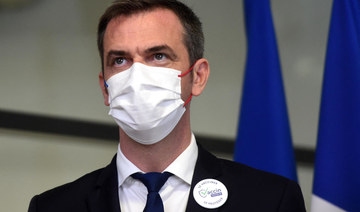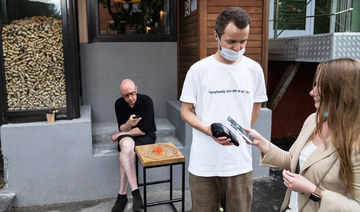LISBON/LONDON: While not a complete wash-out, the summer tourism season vital to southern Europe’s economies will be less than sizzling as the Delta coronavirus spreads and travel hurdles keep British and other sun-seekers at home.
A European Union COVID-19 travel certificate launched on Thursday may help some make trips but arrivals to tourist hotspots from Portugal to Croatia are set to remain well down on normal levels, putting businesses and hospitality jobs at risk.
“The recovery of tourism in Portugal has come to a halt,” Raul Martins, head of the country’s AHP hotel association said of new travel restrictions from Britain and Germany, normally lucrative markets for Portugal’s beaches, restaurants and clubs.
The fast-spreading Delta variant of coronavirus is pushing a rise in cases in the Algarve’s tourist magnet Albufeira and is to blame for over half of new infections in the capital Lisbon.
Add to that Britain’s decision last month to strike Portugal from its “green list” of destinations and Germany’s move to curb travel there just ahead of the introduction of EU certificates showing a tourist’s double-vaccination or COVID-free status.
Even before the German decision and a recent Portuguese rule for unvaccinated UK travelers to quarantine, hotels there forecast occupancy rates of just 43 percent this month and 46 percent for August. AHP said hotels would be more downbeat if polled now.
Save for a few bright spots, the sector is seeing the same pattern across the entire south of Europe: better than the lost summer of 2020, but barely half the activity it would normally expect before the pandemic.
In Greece, where tourism makes up a fifth of the economy, the central bank this week cited concerns over new variants as it cut forecasts for 2021 tourism revenues from 50 percent to 40 percent of those in 2019, when it welcomed a record 33 million visitors.
Grigoris Tassios, head of Greece’s Hoteliers Association, said the average occupancy rate at hotels across the country was currently 35-45 percent, a rate he saw persisting through early July.
“Bookings have frozen clearly because of the uncertainty over COVID and particularly the Delta variant lately,” he said.
Spain is a shade more optimistic, raising its estimate for this year’s tourist numbers to 45 million visitors — about 54 percent of 2019 levels — from the 42 million it predicted a month ago.
The tourism ministry on Wednesday was particularly upbeat about the German market, expecting the number of German tourists to reach 3.8 million this year, a strong 77 percent of 2019 numbers.
Mallorca and Spain’s other Balearic islands are meanwhile reaping the benefit of the June 30 move by the UK to allow Britons to travel there without having to quarantine upon return: air bookings there stand at 80 percent of pre-pandemic levels.
“Since restrictions for UK tourists were lifted, they are back. In the first 24 hours, we had reservations equivalent to 10 days of 2019,” said a spokesperson for Spanish chain Melia Hotels.
In the northern European countries which provide the sun-seekers, holiday industries are lobbying governments to find safe ways to make more destinations available — and quickly.
Britain’s plan to restart travel in May after over four months of lockdown has to date hugely disappointed tour operators, with only a limited number of smaller destinations currently on its “green list” of quarantine-free travel.
“This is not the meaningful restart of international travel that the industry desperately needs,” said a spokesperson for ABTA, the UK industry body representing 4,300 travel brands.
It is urging the government to make good on proposals to relax quarantine rules for fully vaccinated individuals visiting countries on the “amber list” like Spain and France.
“But this needs to happen soon so businesses can save what remains of the peak summer season, crucial weeks which represent two-thirds of travel companies’ income,” said the spokesperson.
A major headache for the UK industry is coping with sudden rule changes in destination countries — Malta, for instance, banned British visitors who are not fully vaccinated on Tuesday.
Germany’s travel sector is also demanding clarity after the move to declare Portugal a “virus-variant zone,” a measure that implies a 14-day quarantine for travelers. Industry leaders warned the government this week any steps to include countries like Greece and Spain in that band would be devastating.
“This current debate about further possible changes is needlessly disconcerting people and damaging confidence,” said Thomas Bareiss, the government’s federal tourism commissioner.
Some remain upbeat. Tomas Dvorak, economist at Oxford Economics, said southern Europe could still recoup by the end of the year around 85 percent of its 2019 levels if vaccine campaigns continue to step up and bring overall infections down.
But a McKinsey report this week painted a stark picture of the wider damage to the region’s economy, with a full recovery of foreign tourism in some cases not likely before 2024-2025.
It estimated Portugal would lose some 52 billion euros of revenues between 2020-2023 — the equivalent of a quarter of its total 2019 GDP — with up to 600,000 jobs potentially affected.
In Spain’s case, it said international tourism might not recover till 2025, putting a massive 4.4 million direct and indirect jobs at risk. It saw Italy benefiting from a more resilient domestic tourist market to recover earlier in 2024.
While a UN study this week welcomed the EU COVID-19 pass as a rare example of countries harmonizing arrangements on travel, it will not be enough to rescue the European summer.
Capital Economics argued it did not remove constraints for those not fully vaccinated — meaning many travelers including children will still need to undergo COVID-19 tests — and that specific travel rules were still set by national governments.
That is a point that resonates in Portugal, still stung by the German travel curbs.
“There are different countries and each country wants to show its sovereignty,” said the AHP’s Martins. We believe that the certificate will work but there are countries saying ‘my house, my rules’.”
Rising Delta virus, absent Brits dampen Europe’s tourism hopes
https://arab.news/j9mzf
Rising Delta virus, absent Brits dampen Europe’s tourism hopes
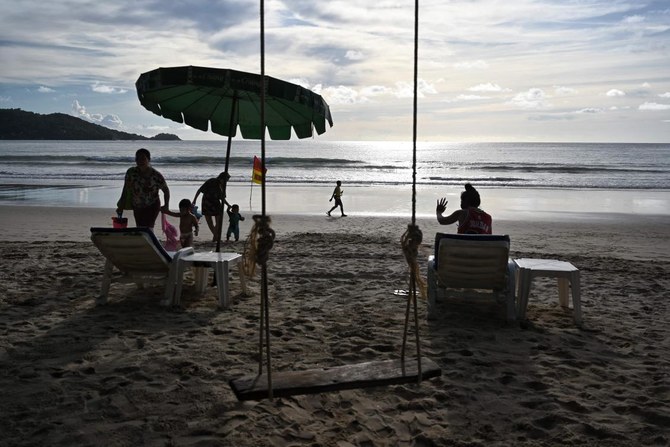
- The fast-spreading Delta variant of coronavirus is pushing a rise in cases globally
Suspected Kashmir rebels kill Indian air force corporal
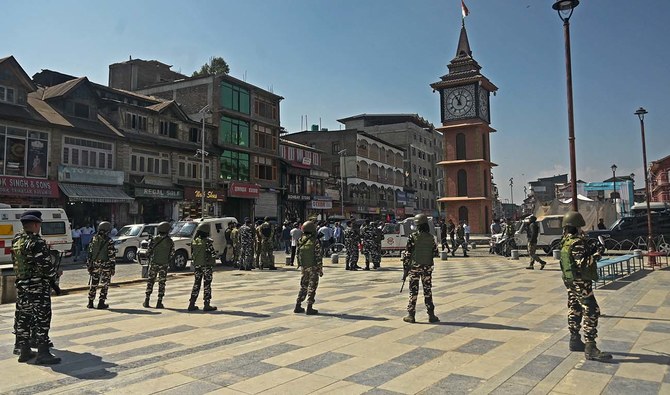
- Suspected rebels ambushed military convoy in Indian-administered Kashmir, Indian Air Force says
- Since 1989, rebel groups opposed to Indian rule have waged insurgency in disputed territory
SRINAGAR, India: An Indian air force member was killed and four more injured when suspected rebels ambushed a military convoy in Indian-administered Kashmir, an official statement said, as campaigning for national elections continues in the disputed territory.
The convoy was attacked by an unknown number of armed militants who sprayed automatic rifle fire toward at least one air force truck in the mountainous Poonch area, 200 kilometers (124 miles) south of the main city of Srinagar, the air force said in a statement.
Five air force personnel were hit in the firefight late Saturday and “one Air Warrior succumbed to his injuries later,” it said, identifying the dead man as a corporal.
A neighboring constituency took part in the first phase of India’s general election on April 19, and Poonch voters were originally scheduled to cast their ballots this week but the Election Commission of India has postponed the polling to May 25 because of inclement weather in recent days.
Kashmir has been divided between India and Pakistan since their independence in 1947, with both claiming the high-altitude territory in full but administering it in parts.
Since 1989, rebel groups opposed to Indian rule have waged an insurgency in Indian-controlled Kashmir, demanding either independence or a merger with Pakistan.
The conflict has left tens of thousands of civilians, soldiers and militants dead.
Rebel activity in the territory has registered an uptick since last month as campaigning for the elections picked up in the restive region.
In April, three suspected rebels were killed and a police officer and three soldiers wounded in three separate clashes across the territory.
Violence has drastically dropped since 2019, when Prime Minister Narendra Modi’s government revoked the region’s limited autonomy and stepped up a security chokehold.
Voting in India’s six-week-long national election, which started last month, will end on June 1.
Driver dies after crashing into White House perimeter gate, Secret Service says

- The driver was not immediately identified
WASHINGTON: A driver died after crashing a vehicle into a gate at the White House Saturday night, authorities said.
The driver was found dead in the vehicle following the crash shortly before 10:30 p.m. at an outer perimeter gate of the White House complex, the US Secret Service said in a statement.
Security protocols were implemented but there was no threat to the White House, the agency said.
The driver was not immediately identified.
The Secret Service will continue to investigate the matter, while turning over the fatal crash portion of the investigation to the Washington Metropolitan Police Department, the agency said.
Fake videos of Modi aides trigger political showdown in India election

- Indian police arrest nine people for circulating fake video of Indian Home Minister Amit Shah
- With more than 800 million Internet users, tackling misinformation in India is a huge challenge
BENGALURU/LUCKNOW: Manipulated videos are taking center stage as campaigning heats up in India’s election, with fake clips involving two top aides of Prime Minister Narendra Modi triggering police investigations and the arrest of some workers of his rival Congress party.
In what has been dubbed as India’s first AI election, Modi said last week fake voices were being used to purportedly show leaders making “statements that we have never even thought of,” calling it a conspiracy “to create tension in society.”
Indian police — already investigating the spread of fake videos showing Bollywood actors criticizing Modi — are now investigating a doctored online clip that showed federal home minister Amit Shah saying the ruling Bharatiya Janata Party will stop certain social guarantees for minorities, a subject sensitive for millions of voters.
Shah retorted on X, posting his “original” and the edited “fake” speech and alleging — without providing any evidence — that the main opposition Congress was behind the video it created to mislead the public. The minister said “directions have been issued to the police to address this issue.”
Indian police arrested at least nine people, including six members of Congress’ social media teams, in the states of Assam, Gujarat, Telangana and New Delhi last week for circulating the fake video, according to police statements.
Five of the Congress workers were released on bail, but the most high-profile arrest made by the cybercrime unit of New Delhi police came on Friday, when they detained a Congress national social media coordinator, Arun Reddy, for sharing the video. New Delhi is one region where Shah’s ministry directly controls police. Reddy has been sent into three-day custody.
The arrest has sparked protests from Congress workers with many posting on X using the #ReleaseArunReddy tag. Congress lawmaker Manickam Tagore said the arrest was an example of “authoritarian misuse of power by the regime.”
Congress’ head of social media, Supriya Shrinate, did not respond to messages and an email seeking comment.
MISINFORMATION
India’s election from April 19 to June 1 will be the world’s largest democratic event. With nearly a billion voters and more than 800 million Internet users, tackling the spread of misinformation is a high stakes job. It involves round-the-clock monitoring by police and election officials who often issue take down orders to Facebook and X as investigations start.
In India’s most populous state of Uttar Pradesh, more than 500 people keep tabs on online content, flagging controversial posts and coordinating with social media companies for their removal when needed, police chief Prashant Kumar told Reuters on Saturday.
Another fake video that sparked a storm last week showed Yogi Adityanath, the state’s chief minister, criticizing Modi for not doing enough for families of those who died in a 2019 militant attack. Though fact checkers said the video was created using different parts of an original clip, state police called it an “AI generated, deepfake.”
Using Internet address tracking, state police arrested a man named Shyam Gupta on May 2 who had shared the fake video post on X a day earlier, receiving over 3,000 views and 11 likes.
The police have accused Gupta of forgery and promoting enmity under Indian law provisions that can carry a jail term of up to seven years if convicted. Reuters could not reach him as he is currently serving a 14-day custody period.
“This person is not a tech guy. Had he been tech savvy, arresting him quickly would not have been possible,” said police officer Kumar.
Australian police shoot boy dead after stabbing with ‘hallmarks’ of terrorism

SYDNEY,: Australian police said on Sunday they had shot dead a boy after he stabbed a man in Western Australia’s capital Perth, in an attack authorities said indicated terrorism.
There were signs the 16-year-old, armed with a kitchen knife, had been radicalized online, state authorities said, adding they received calls from concerned members of the local Muslim community before the attack, which occurred late on Saturday night.
The attack, in the suburb of Willetton, had “hallmarks” of terrorism but was yet to be declared a terrorist act, police said.
“At this stage it appears that he acted solely and alone,” Western Australia Premier Roger Cook told a televised press conference in the state capital Perth, regarding the attacker.
The victim, stabbed in the back, was stable in hospital, authorities said.
Prime Minister Anthony Albanese said he had been briefed on the incident by police and intelligence agencies, which advised there was no ongoing threat.
“We are a peace-loving nation and there is no place for violent extremism in Australia,” Albanese said on social media platform X.
The incident comes after New South Wales police last month charged several boys with terrorism-related offenses in investigations following the stabbing of an Assyrian Christian bishop while he was giving a live-streamed sermon in Sydney, on April 15.
The attack on the bishop came only days after a stabbing spree killed six in the Sydney beachside suburb of Bondi.
Gun and knife crime is rare in Australia, which consistently ranks among the safest countries in the world, according to the federal government. (Reporting by Sam McKeith in Sydney; Editing by Christian Schmollinger and William Mallard)
North Korea’s UN ambassador says new sanctions monitoring groups will fail
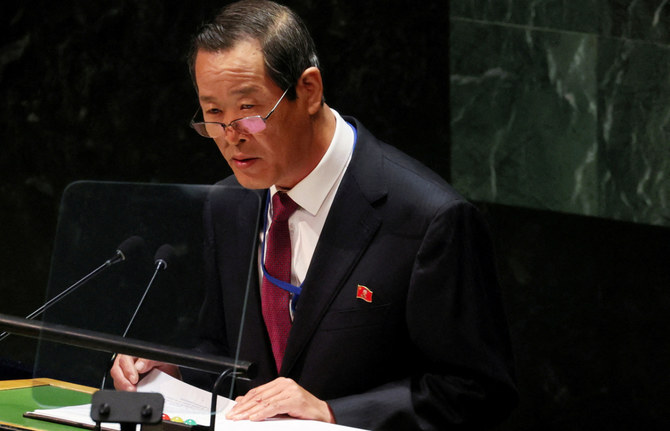
- Earlier this year, Russia vetoed the annual renewal of a panel of experts amid US-led accusations that North Korea has transferred weapons to Russia for use in its war in Ukraine
SEOUL: Efforts led by the US and other Western countries to form new groups to monitor sanctions on North Korea will fail, the country’s UN envoy said on Sunday, according to state media KCNA.
Ambassador Kim Song made the comment in response to a joint statement the US and its allies issued this week calling to continue the work of a UN panel of experts monitoring longstanding sanctions against Pyongyang for its nuclear weapons and missile programs.
Earlier this year, Russia vetoed the annual renewal of the panel amid US-led accusations that North Korea has transferred weapons to Russia for use in its war in Ukraine.
“The hostile forces may set up the second and third expert panels in the future but they are all bound to meet self-destruction with the passage of time,” KCNA quotes Kim as saying in a statement.
Last month, US Ambassador to the United Nations Linda Thomas-Greenfield visited the Demilitarized Zone, a heavily fortified border between the two Koreas, which remain technically at war and urged Russia and China to stop rewarding North Korea for its bad behavior.
Her trip came after Russia rejected the annual renewal of the multinational panel of experts that has over the past 15 years monitored the implementation of UN sanctions aimed at curbing North Korea’s nuclear and missile programs.



